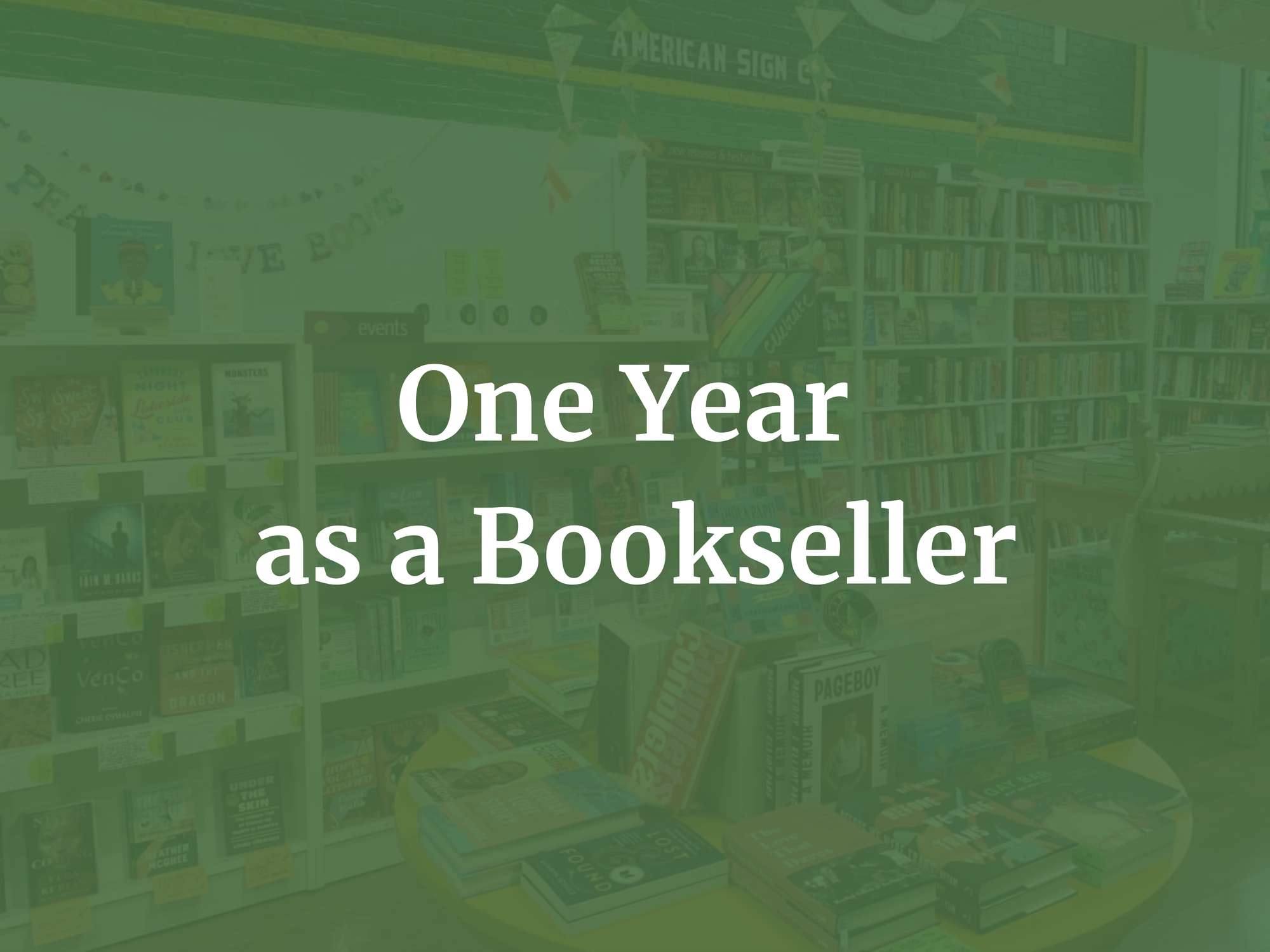4 Lessons I've Learned Working at an Indie Bookshop

I didn't grow up around many bookshops and the one room local libraries were always at least a 30 minute drive away. As a kid, getting to spend time surrounded by so many books was a special treat—even now, I find these places to be sources of refuge and discovery, offering calm and inspiration.
I'd long daydreamed about working at a bookshop, but the idea of becoming a bookseller seemed pretty impossible. In 2020, I was wrapping up a Master's in Teaching when my partner and I both lost our first full-time jobs to the pandemic. Going to live with family wasn't an option for us and so I spent a year scrambling, taking on odd contract work, freelancing, and selling stuff online before I found work in higher ed administration.
That job felt like a godsend, giving me a much coveted opportunity to recover financially from the pandemic's onset.
I was paid around $50k a year and, living in Boston, even that was pretty tight at times. I simply couldn't risk giving that job up to face the massive pay cut and increased COVID exposure becoming a bookseller entailed.
Fast forward to 2024. I'd moved to DC in large part because of the city's lower cost of living and to move in with my two other partners. I'd quit that higher ed job, escaping constant drama and demoralizing burnout, and finally had some savings put away. It was only then, splitting rent with three other people who had full-time jobs (and who were willing to make financial sacrifices for me) alongside the cushion of my own savings that I felt secure enough to even apply for a bookseller role.
I'm telling you this because I want you to know that, ironically, working a minimum wage job has been a privilege for me. To take on that kind of pay cut without fear is something I'm grateful for every day because, man...I love being a bookseller.
I've been a Bookseller & Social Media Assistant at East City Bookshop in DC since May 2024 and, boy oh boy, has the job changed the way I see reading, writing, and the world of bookselling.
Lesson #1: There Are No Bad Books
Ok...I kind of already knew this, but I hadn't put this philosophy into practice. Of course, there are books that are harmful, hateful, and/or support the careers of despicable people. Those books are "bad" in the sense that they contradict my morals.
When I say "there are no bad books", what I mean is just because a book isn't subjectively appealing to you, it doesn't make it "a bad book".
Going into bookselling, I understood this, but I struggled to talk up or praise books I didn't like. I didn't know how to find the redeeming qualities in genres I didn't prefer and froze when customers asked me for comp titles for books I personally didn't enjoy.
However, with greater access to free books (advanced reader copies/galleys, damaged and unsellable copies, etc), I started reading more and more widely this past year. I finished books I didn't necessarily love for the sake of broadening my knowledge of our stock and being better able to assist customers with different tastes.
What this allowed me to do was more closely examine what aspects of a book I liked and what I didn't. For the most part, even books that weren't 5 star reads for me had qualities I admired, enjoyed, or thought were successful. I started finding it easier to write positive reviews for books I didn't 100% adore because I could isolate the parts of the book I found worth celebrating.
This was also a worthwhile skill to learn as a writer–getting a sharper sense of what it is I like about a book and what I seek to emulate in my own work.
Now, I feel more comfortable and confident recommending books to others because I can recognize the potential for appreciation across a far wider variety of stories, genres, and writing styles.
Lesson #2: Bookshops Are Businesses
There is an undeniable sense of magic I still feel every time I go into work as a bookseller. However, at the end of the day, a bookshop can't survive unless it operates as a business...which is decidedly less magical. 🙃
I've already mentioned how indie bookshops can't afford to pay their employees very much. That's something I knew going into bookselling and was ready to accept the consequences of. What I wasn't quite ready for was the fact that every sale matters.
There are many books that I frankly don't want to sell to customers. There are some books I'd much rather slap out of someone's hand than ring out at the register. But I can't do that. Bookshops can't afford to do that.
Luckily, I work at a shop that is receptive to customer and staff feedback regarding what books we stock. For example, it was a nearly instantaneous, unanimous decision to stop stocking Neil Gaiman books this past year. However, there are still many books our shop continues to stock because, unfortunately, we can't sacrifice their regular sales.
Some Books I've Wanted to Slap Out of Customers' Hands (an abbreviated list):
- any of the Harry Potter books
- The 48 Laws of Power by Robert Greene (you'd be surprised how much this sells in DC)
- A Little Life by Hanya Yanagihara (truly the most frequent offender)
95% of the time, this really isn't an issue. For the most part, I get to sell and chat with customers about books that I love. Sometimes, however, I need to bite my tongue and let the customer do what they like to secure income for the shop and, by extension, myself.
This has been a bitter pill to swallow over the past year. Still, you better believe I spend every minute I can harping on Yanagihara and offering customers alternatives to Harry Potter (of which there are many! might I suggest The Marvellers, Witchlings, Nevermoor, Akata Witch, Keeper of the Lost Cities, and A Deadly Education to name a few).
Lesson #3: Not All Booksellers Are Writers..and that's a good thing
I used to have the impression that all booksellers must be writers or at least interested in writing. I suppose this was because all booksellers I knew previously I knew because they were writers.
Most of my coworkers aren't all that interested in writing and consider me the only writer on staff. At first, I was a little disappointed about this. I wanted to talk shop all the time! Meet new writerly friends! If they weren't writers, how else would my colleagues understand how sensitive and artistic I am? 😔
Ultimately, I think I've gained more from my coworkers not being writers. It's been wonderful learning the diversity of experiences booksellers come from and what brings so many different people to books.
Talking with my coworkers about what books they love and why they love them has also helped me relax my relationship with reading. I used to feel a certain degree of pressure whenever I read because I am a writer. I told myself that I had to study every sentence, every word of every book I ever read. Close reading is a useful learning strategy, but doing it all the time was exhausting and, honestly, made me avoid reading more than anything.
Seeing books through non-writerly eyes was a gift, a much needed shift in perspective that helped me develop a more sustainable, more enjoyable relationship with reading.
Plus, my coworkers are great at giving recommendations that push me out of my reading comfort zone! Thanks to them, I've discovered new favorite authors and books I likely never would've read otherwise.
Lesson #4: Bookshops Are Community
I've always loved spending time in bookshops and I know our customers feel the same way. It's so special interacting with regular shoppers and building real friendships with them. I've never felt so connected with my neighborhood as I do now that I work at an indie bookshop. I recognize people out on the street, in the grocery store, at the gym–and they recognize me.
That being said, I really encourage you to chat with your local indie booksellers! I promise you, we're a pretty cool bunch. ❤️

In celebration of one year as a bookseller, this month's recs are my favorite books to recommend (or handsell, if you're savvy to the lingo 😉) to customers!
Recognizing the Stranger: on Palestine and Narrative by Isabella Hammad
Hammad's approach to criticism, theory, and political commentary is so elegant and precise–not a single word was out of place. Hammad contends with some serious literary legacies in this lecture–most notably that of Edward Said and Ancient Greek tragedy–yet her observations and connections are startlingly original. This is a critical work on the correlations of literature, politics, nostalgia, empathy, and our shared humanity. A succinct reflection on what it means to be at a turning point in history. A must-read on Palestine.
If an Egyptian Cannot Speak English by Noor Naga
This book absolutely shocked me–an unrelenting analysis of imperialism, privilege, sexism, ethnic identity, language, and power in intimate relationships set against an equally unforgiving cityscape. Naga's genre-busting approach to the novel is sure to surprise and engage even the most voracious reader. Beautiful, unsettling, and a book whose questions continue to haunt me.
Taiwan Travelogue by Yáng Shuāng-Zǐ
A feast for foodies, fans of sapphic longing, and anyone interested in literature that contends with colonialism. Set in 1930s Taiwan under Japanese rule and disguised as a translation of a Japanese author's rediscovered work, this book is a palimpsest of language–urging readers to question not only the narrator, but the layers of translation and, ultimately, the lifetimes of imperialism and occupation that delivered this work to our hands. Introspective, honest, and beautifully written.
Playing in the Dark by Toni Morrison
A necessary book for writers and readers of American literature. Morrison is a literary giant taking on the interplay of Blackness and white identity, offering critique of the white American canon. I only wish I had read this book sooner.

Sundress Publications Microgrant for Trans Writers
- Deadline: July 15th 2025
- Awardees Receive: $500, 1 week residency, potential for publication of chapbook or full-length manuscript
The Kyoto Retreat
- Deadline: July 15th 2025
- Awardees Receive: Roundtrip airfare to/from Kansai International Airport, residency from October 16th-November 13th 2025, $800 stipend
Ucross Spring 2026 Residency Program
- Deadline: July 16th 2025
- Awardees Receive: $1,500 stipend, 2-6 week residencies, room and board
- Fellowships and application fee waivers available for Native American writers and artists!
ALOCASIA Magazine's Microgrant for Queer Nature Writers
- Deadline: July 31st 2025
- Award Amount: $500
Gasher Press Bennett Nieberg Transpoetic Broadside Prize
- Deadline: August 1st 2025
- Awardees Receive: $500, 5 custom broadsides of winning poem
